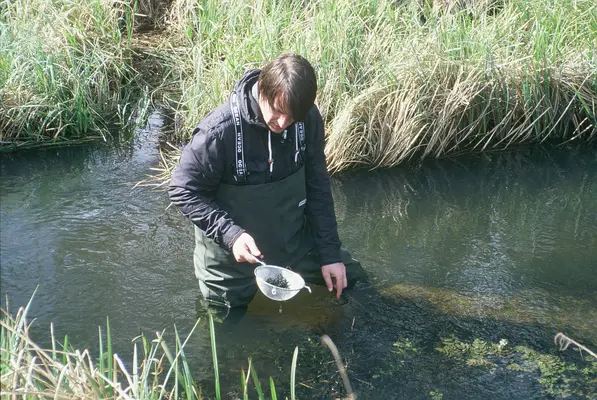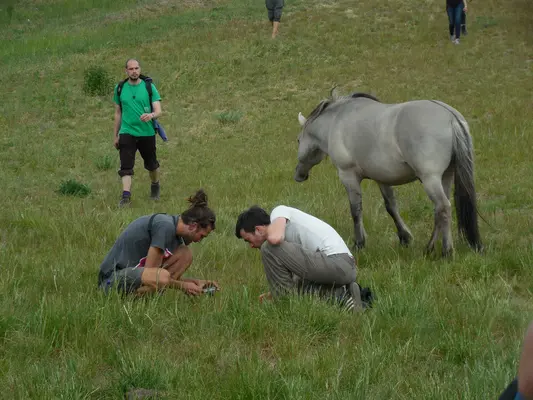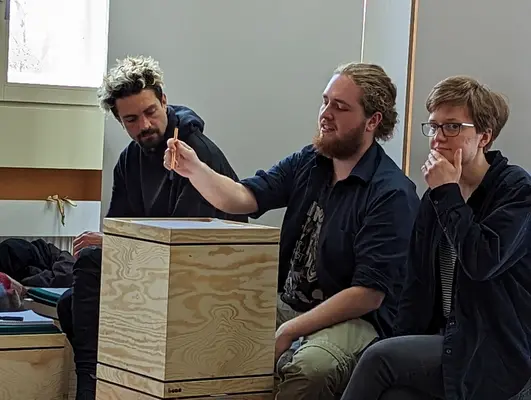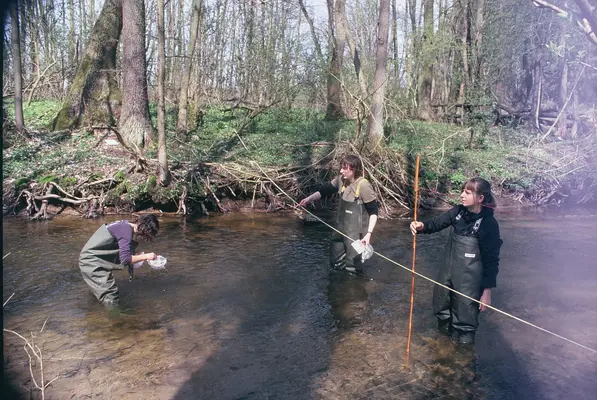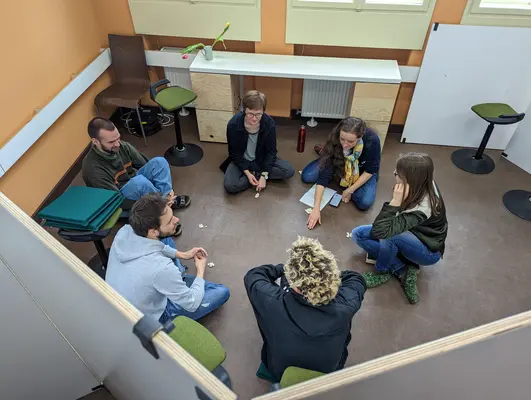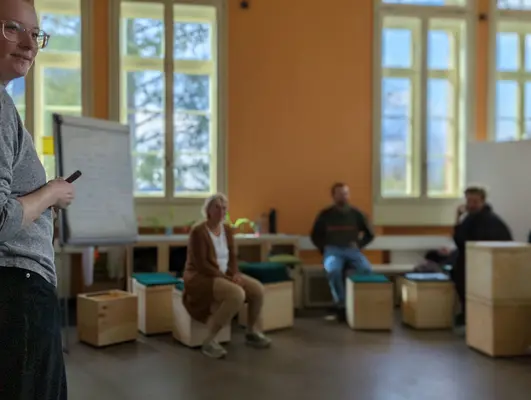Individual study contents
The Master's enables you to view rural regions holistically in their diversity and complexity. In numerous exercises, excursions and project work, the multi-layered regional interplay of landscape, landscape use and society is taught. Knowledge from the natural, planning and social sciences is integrated for this purpose. The degree programme offers you the opportunity to develop your own profile. From the second semester onwards, you can choose between three specialisations: Environmental Education/Education for Sustainable Development (ESD), Biodiversity (Bio) and Individual Profile (Ind.).
Modules per semester
In the first semester, introductory courses on sustainable regional development lay the foundations for understanding regions, sustainability, education and nature conservation (compulsory).
Different approaches and fields of action on the topic of biodiversity and nature conservation are taught, and differences between a dynamic and static approach are explained. The module also deals with protection requirements and utilisation claims as well as the various protection concepts. In addition, the module takes up a specific topic area (e.g. wind power) and analyses its acceptance and success.
Students learn to recognise the characteristics and endogenous potentials of regions. They can then assess the driving forces that affect regions and evaluate instruments in terms of their impact on regional development processes.
In this module, environmental education concepts are analysed and classified. You will be able to design environmental psychological interventions based on theoretical and empirical findings. This module is spread over two sub-modules: Fundamentals of Environmental Education/Education for Sustainable Development and Environmental Psychology in the Context of Educational Work.
The students get to know the legal and political framework in which state-supported regional development takes place in Europe. They know their intervention logic, the institutions involved and can critically assess both. In addition, aspects of economic promotion and private sector support in regional development are addressed and discussed.
The aim of the module is to develop with the group a "common language" and a shared understanding of concepts and terms of sustainable development in order to develop a common frame of reference for sustainable regional development.
In the second semester, the focus is on teaching methodological skills. Here, moderation techniques and the design of participation procedures are practised and spatial planning procedures are penetrated. You will also learn about sustainability transformations in theory and practice. Two compulsory elective modules are planned for the second semester.
This module deals with actors who influence the shaping of rural development. The students penetrate the perspectives and action logics of different groups of actors. The students receive moderation training and deal with different participation methods.
The system of spatial planning in Germany and the environmental assessment procedures for spatially relevant projects are covered. The students know the effects of renewable energies (RE) on the landscape. They are able to formulate and address requirements for a landscape-compatible expansion of RE and for climate adaptation measures.
In the module, students deal with a fundamental change towards sustainability - a sustainability transformation - at regional level. They get to know transformation theories and deal with concrete sustainability projects of regional development (e.g. in biosphere reserves).
The students learn to acquire and process spatial (environmental) data by means of practical exercises in the context of cross-sectional topics of the degree programme. In this module they can plan their own projects.
The students are enabled to assess and evaluate the current state of wetlands. They learn forms of renaturation of old and the development of new qualities or to maintain the condition against the background of climate change adaptation and protection. Sets of methods and guidelines are taught.
The students plan and develop an educational concept in the context of sustainable development in groups. They will implement and reflect on this concept at the end of the module.
Students deal with nature conservation management inside and outside protected areas: They learn about nature conservation strategies and their implementation, from practical individual measures for nature conservation and landscape management to large-scale management approaches in terrestrial and aquatic areas. Within the framework of field exercises and excursions to selected projects, they have contact with different actors and move within different framework conditions.
The students learn to design, analyse and classify tourism and environmental education concepts in rural areas.
The module is divided into two sub-modules: 1) Tourism in rural areas (ESD, Ind), 2a) Cultural Landscape (Ind) and 2b) Non-formal Environmental Education in Leisure /Interpretation (ESD).
Students are enabled to understand agro-ecological interrelations, political framework conditions and potentials of different agroforestry systems. They learn to assess and evaluate these systems with regard to their practical feasibility.
The Special Elective Modules (syn. Special Topic) I and II, can be completed in other Master's programmes at the HNEE and at other universities. The following regulations apply to both modules: The modules mentioned must have a content-related connection to the chosen field of study of the Master's programme NaRegio and comprise at least the same amount in ECTS credit points (6 ECTS credit points). Students submit information about this to the person responsible for the module before the registration procedure of the compulsory elective modules of the HNEE. The person responsible for the module then checks and, if necessary, confirms the suitability of the selected module. The student forwards the confirmation together with the proof of the examination performance to the examination office on his/her own responsibility.
Individual modules, here in particular the compulsory elective modules "Special Topic I" and "Special Topic II", can be completed in other Master's degree programmes at the Eberswalde University of Applied Sciences and at partner universities. The following regulations apply to both modules: The modules mentioned must have a content-related connection to the Master's degree programme "Sustainable Regional Development" and comprise at least the same scope in ECTS credit points. The student submits information about this to the person responsible for the module. The person responsible for the module then confirms the suitability of the selected module. The student forwards this to the examination office on his/her own responsibility together with the proof of the examination performance.
The special topics can be recognised for one of the three fields of study, provided they have a profile-forming effect in terms of content. The lecturers responsible for the fields of study (Environmental Education - Prof. Molitor / Biodiversity Management - Prof. Stöckmann / Individual Profiling - Prof. Peters) decide on the creditability.
Additional information on the Special Elective Modules I and II
In the third semester, students work in small groups on a comprehensive project of sustainable regional development with and for partners from practice. Three elective modules are planned for the third semester.
In this module, students independently carry out methodically guided project work in groups (4-6 students). Current topics are worked on in cooperation with practice partners throughout the semester and selected by the students before the start of each lecture period. Theoretical focuses are the four levels of holistic project design, methods of project planning and project management.
Students deal with nature advice for agriculture and other land users. They deal with measures for the conservation and promotion of biodiversity in the cultural landscape. The students know the current monitoring programmes in the context of nature conservation and the requirements for them.
In addition to the basics of adult education, application-oriented contents are taught in this module. The students learn to be able to analyse these with reference to sustainable development.
The students are enabled to implement complex issues around the application areas of geoinformation systems. Through practical exercises, they learn to design, implement, commission and review research and development projects.
Students understand the connections between management practices in - especially agricultural - land use systems and biodiversity. They learn biological and ecological basics of nature-friendly land use and different approaches to achieve nature conservation goals.
The aim of the module is that students are able to use participatory methods of education for sustainable development. Participation methods are taught in theory and practice.
The students get to know two practice-related tasks in more detail: 1. basics and instruments of public relations as well as suitable strategies of public communication in a regional context.
2. basics of location marketing, requirements for sustainable location marketing and suitable instruments for its implementation.
The Special Elective Modules (syn. Special Topic) I and II, can be completed in other Master's programmes at the HNEE and at other universities. The following regulations apply to both modules: The modules mentioned must have a content-related connection to the chosen field of study of the Master's programme NaRegio and comprise at least the same amount in ECTS credit points (6 ECTS credit points). Students submit information about this to the person responsible for the module before the registration procedure of the compulsory elective modules of the HNEE. The person responsible for the module then checks and, if necessary, confirms the suitability of the selected module. The student forwards the confirmation together with the proof of the examination performance to the examination office on his/her own responsibility.
Individual modules, here in particular the compulsory elective modules "Special Topic I" and "Special Topic II", can be completed in other Master's degree programmes at the Eberswalde University of Applied Sciences and at partner universities. The following regulations apply to both modules: The modules mentioned must have a content-related connection to the Master's degree programme "Sustainable Regional Development" and must comprise at least the same scope in ECTS credit points. The student submits information about this to the person responsible for the module. The person responsible for the module then confirms the suitability of the selected module. The student forwards this to the examination office on his/her own responsibility together with the proof of the examination performance.
The special topics can be recognised for one of the three fields of study, provided they have a profile-forming effect in terms of content. The lecturers responsible for the fields of study (Environmental Education - Prof. Molitor / Biodiversity Management - Prof. Stöckmann / Individual Profiling - Prof. Peters) decide on the creditability.
Additional information on the Special Elective Modules I and II
In the fourth semester, the Master's thesis is written and accompanying courses are attended.
Preparation of a Master's thesis.
- Characteristics of social-ecological research
- Phases in the research process
- Survey methods and data evaluation
- Interpretation of results and dissemination into practice
Critical reflection on student research designs.
